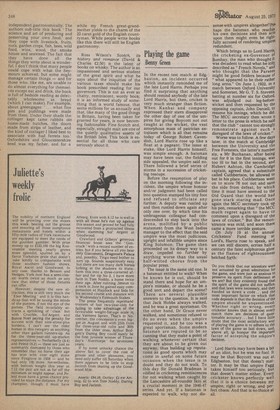Playing the game
Benny Green
In the recent test match at Edg.baston, an incident occurred which instantly reminded me of the late Lord Harris. Perhaps you find it surprising that anything should remind anybody of the late Lord Harris, but then, cricket is very much stranger than fiction. When Kanhai and company expressed their stern disapproval the other day of one of the umpires for giving Boycott not out caught at the wicket, the vast amorphous mass of patrician extoplasm which is all that remains today of George Robert Cavendish, Lord Harris rose up like a float at a pageant. The issue at stake, like Lord Harris himself, was simple enough. A batsman may have been out, the fielding side appealed, the umpire said no. There followed a brief series of storms in a succession of cricketing teacups.
Before the resumption of play on the morning following the incident, the umpire whose honour and/or judgment had been called into question stamped his tiny foot and refused to officiate any further. A deputy was rustled up and then rustled down again after only one over, by which time his umbrageous colleague had condescended to step back into the arena, mollified by a public statement from the West Indies manager to the effect that the said umpire was the most judicious, upright and infallible umpire since King Solomon. The game then proceeded on its dreary way to a draw, impeded no further by anything worse than the usual half-witted chorus from the popular press.
The issue is the same old one. Is a batsman entitled to walk? When he knows he is out, should he stand there and hope for an umpire's mistake, or should he be a good sort and depart the scene? There are several plausible answers to the question. It is said that Jack Hobbs always walked, and he was a great sportsman. On the other hand, Dr Grace never walked, and sometimes refused to do so even when the umpire requested it, and he too was a great sportsman. Some modern batsmen are reputed to be so cunning that they make a point of walking whenever certain that they are about to be given out anyway, thus building up reputations as good sports which may come in useful on some future occasion when the issue is in doubt and they do not walk. To this day Sir Donald Bradman is vilified in cricketing reminiscences for not walking when caught by the Lancashire all-rounder Ikin at a crucial moment in the 1946-47 series. And yet. If a batsman is expected to walk, why not dis
Dense with umpires altogether? perhaps the batsman who reaches, his own decisions and then acts upon them might even be right. fully accused of rendering umpires redundant.
Which brings us to Lord Harris, the cricketing ex-Governor of Dornbay, the man who thought It was decadent to read what he icily, described as "French Novels," and who thought that the Parsees might be good fielders because of "what appeared to be their rather long arms." On June 1, 1922, in a match between Oxford University and Somerset, Mr G. T. S. Stevens. batting at number six for Oxford, was adjudged out leg-beforeWicket and then requested by the opposing captain, John Daniell, to resume his innings, which he did. The MCC secretary then wrote a letter to the press in which he said that the club " cannot too strongly remonstrate against such a disregard of the laws of cricket."
Worse was to follow. A few days later, in the match at Cambridge between the University and the Free Foresters, the latter's number six, a Mr Buchanan, after being out for 0 in the first innings, was too ill to bat in the second, and Hubert Ashton, the Cambridge captain, agreed that a substitute called Cuthbertson, be allowed to bat in his place. Cuthbertson went on to score 76 not out and save the side from defeat, by which time it must have seemed to the Old Guard that the world had gone stark staring mad. Once again the MCC secretary took up his pen, remarking that " the MCC much regret again to have to comment upon a disregard of the laws of cricket." But the remonttrance was mild, and soon there came a more terrible gesture. On July 19 at the annual Cricketers' Fund meeting at Lord's, Harris rose to speak, and we can still discern, across half a century the faint sulphurous glow as the flames of righteousness belched forth: -Do you think that our ancestors were not actuated by great admiration for
the game, and were just as anxious to preserve its spirit from defilement as we are? But they evidently found that
the spirit of the game did not suffice, and that laws were necessary, and they handed us down a code ... and the most important factor on which that code depends is that the decision of the umpire should be unquestionedWhether right or wrong, everY cricketer knows that in almost everY match there are decisions of questionable accuracy ... but I have little doubt that the most satisfactory waY of playing the game is to adhere to the laws of the game as laid down, and, above all, tp honour the important factor of accepting the umpire's decision.
Lord Harris may have been a bit of an idiot, but he was no fool. It may be that Boycott was out at Edgbaston, but that doesn't matter. It may be that umpire Fagg takes himself too seriously, but that doesn't matter either. Every cricketer knows perfectly well that it is a choice between my umpire, right or wrong, and perfect chaos. And that is no choice at all.


































 Previous page
Previous page